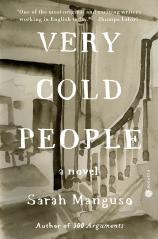Very Cold People
Review
Very Cold People
VERY COLD PEOPLE, Sarah Manguso’s debut novel, explores the small-town Massachusetts upbringing of a girl caught between cultures, stymied by economic anxieties, and trapped by a family that is very cold indeed.
Waitsfield is a place populated by old-money families, but Ruthie is descended from more recent immigrants. It’s the 1980s, and her parents are painfully stingy, collecting trash and buying secondhand even when they no longer need to do so. They cultivate an anti-Waitsfield attitude --- loud, crass and emotional in a world of icy WASP society. They are also stingy with their affections for their daughter. Ruthie is a keen observer of her parents and her environment. She unflinchingly notes her father’s anger and his fake Rolex, her mother’s concern for appearances and lack of taste. She sees them covet the comfortable lives of their family members and neighbors, and she experiences their unwillingness to offer kindness to their only child.
"Manguso’s unique voice makes VERY COLD PEOPLE challenging, but this worthwhile novel is compelling, smart and full of heartache."
Manguso reveals Ruthie’s story paragraph by paragraph in a choppy narrative style. Readers are given a series of seemingly disconnected and roughly chronological memories and remembrances recounted with a brash poeticism and an unsparing, even dispirited manner. Ruthie’s eye is clinical and rarely emotional. Hers is a parallel to the coldness she calls out in others, but its source is different from theirs and serves Manguso’s storytelling well.
VERY COLD PEOPLE is tense throughout. It is tense as Ruthie and her parents watch television together, as they spend time with their wealthy extended family, as she places her own family in relation to the wealth and poverty of her friend’s families. It is tense as her father yells and her mother manipulates, as she despises them yet seeks their approval. Manguso’s portrayals are always on the verge of caricatures: the vain and neurotic Jewish mother and the cheap, angry Italian father. But then readers are made to recall that this lens belongs to Ruthie, and a young Ruthie at that. These are the flashes and feelings of her childhood, fears, inherited insecurities and reality in a town that hides away its pains and truths.
It is not just Ruthie’s family’s truths, but those of her friends as well. Her closest friends suffer from family abuses, and struggle with poverty or class issues. Readers don’t get to know them well, but they too seem negatively impacted by the quiet oppressions of Waitsfield. The novel is a record of casual cruelties and observations of a confusing society. While the poverty of Ruthie’s family, as described, doesn’t always make sense, it is symbolic of the bizarre frugality of her parents. For example, they use razors until they are so old and dull that they cause rashes, but Ruthie has years of piano lessons.
Moments of raw reflection (as opposed to description) are rare here, but all the more affecting when they arrive. “I like to visit with the exhausted girl who once was me,” Manguso writes, just past the halfway point of the book, and readers start to feel the import of her tale, the sorrow and inherited trauma she is exploring. Ruthie wrestles with this sorrow and trauma, along with the blanket of shame that lays over her family and the ways in which shame can grow from need and desire as well as from pain.
Manguso’s unique voice makes VERY COLD PEOPLE challenging, but this worthwhile novel is compelling, smart and full of heartache.
Reviewed by Sarah Rachel Egelman on February 24, 2022
Very Cold People
- Publication Date: January 3, 2023
- Genres: Fiction
- Paperback: 208 pages
- Publisher: Hogarth
- ISBN-10: 059324124X
- ISBN-13: 9780593241240




